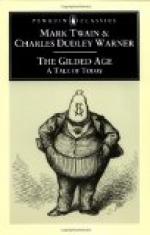At the little station where Philip waited for the next train, he met a man—who turned out to be a justice of the peace in that neighborhood, and told him his adventure. He was a kindly sort of man, and seemed very much interested.
“Dum ’em,” said he, when he had heard the story.
“Do you think any thing can be done, sir?”
“Wal, I guess tain’t no use. I hain’t a mite of doubt of every word you say. But suin’s no use. The railroad company owns all these people along here, and the judges on the bench too. Spiled your clothes! Wal, ‘least said’s soonest mended.’ You haint no chance with the company.”
When next morning, he read the humorous account in the Patriot and Clarion, he saw still more clearly what chance he would have had before the public in a fight with the railroad company.
Still Philip’s conscience told him that it was his plain duty to carry the matter into the courts, even with the certainty of defeat. He confessed that neither he nor any citizen had a right to consult his own feelings or conscience in a case where a law of the land had been violated before his own eyes. He confessed that every citizen’s first duty in such case is to put aside his own business and devote his time and his best efforts to seeing that the infraction is promptly punished; and he knew that no country can be well governed unless its citizens as a body keep religiously before their minds that they are the guardians of the law, and that the law officers are only the machinery for its execution, nothing more. As a finality he was obliged to confess that he was a bad citizen, and also that the general laxity of the time, and the absence of a sense of duty toward any part of the community but the individual himself were ingrained in him, am he was no better than the rest of the people.
The result of this little adventure was that Philip did not reach Ilium till daylight the next morning, when he descended sleepy and sore, from a way train, and looked about him. Ilium was in a narrow mountain gorge, through which a rapid stream ran. It consisted of the plank platform on which he stood, a wooden house, half painted, with a dirty piazza (unroofed) in front, and a sign board hung on a slanting pole—bearing the legend, “Hotel. P. Dusenheimer,” a sawmill further down the stream, a blacksmith-shop, and a store, and three or four unpainted dwellings of the slab variety.
As Philip approached the hotel he saw what appeared to be a wild beast crouching on the piazza. It did not stir, however, and he soon found that it was only a stuffed skin. This cheerful invitation to the tavern was the remains of a huge panther which had been killed in the region a few weeks before. Philip examined his ugly visage and strong crooked fore-arm, as he was waiting admittance, having pounded upon the door.
“Yait a bit. I’ll shoost—put on my trowsers,” shouted a voice from the window, and the door was soon opened by the yawning landlord.




